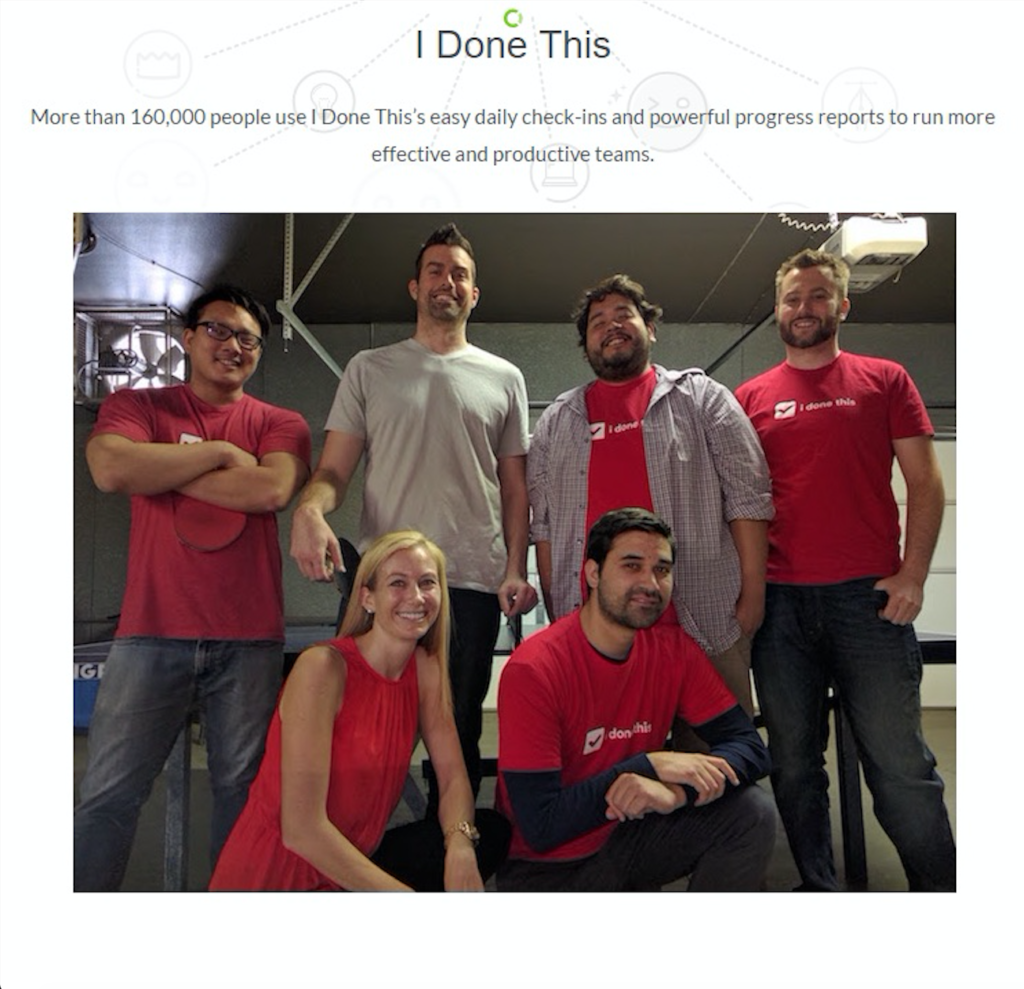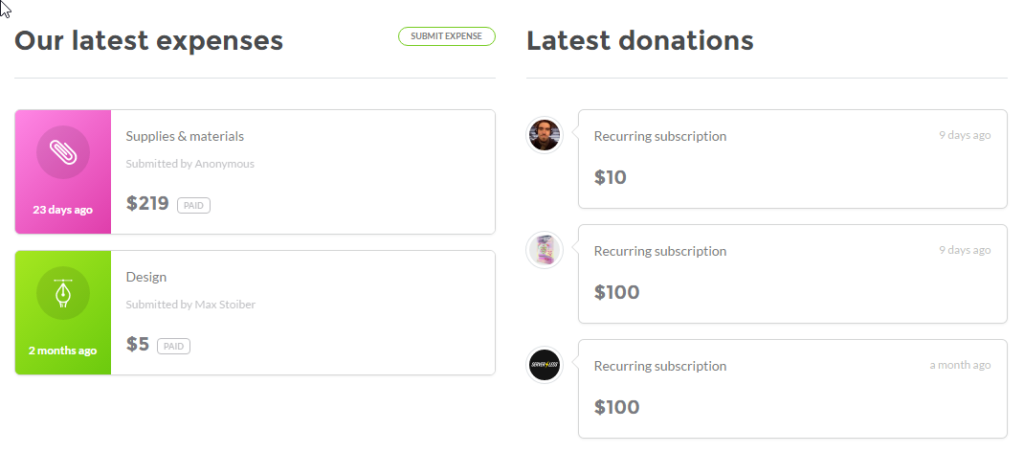I Done This was built by thousands of developers, but we only know two of them.
The same goes for the majority of products popping up every day. Developers aren’t building software from scratch anymore. They’re mostly building on top of Open Source software—software whose source code is publicly available.
I Done This wouldn’t exist without this community, but we’ve never found a way to say thanks. GitHub doesn’t provide an address for thank you cards, and there certainly isn’t a “donate today” button on Stack Overflow. But thanks to a new platform called Open Collective, we finally have a way of giving back to that community.
Open Collective serves as a virtual but completely transparent bank for any sort of community— from Open Source, to Boy Scouts, to Art Collectors—to get funding. This means that the Open Source community finally has access to the resources it needs to grow and continue being the bedrock of the tech industry.

At I Done This, we’re proud to be taking advantage of this awesome platform to finally support a community we’ve long known and loved.
The Need for Open Collective
The idea of Open Collective doesn’t seem like anything novel. Organizations have been collecting money since the invention of—well, money. But founder Xavier Damman noticed that bureaucracies actually make this process incredibly difficult. Any kind of grassroots initiative, whether that’s a non-profit, a community, a movement, or a startup, needs to be considered a “legal entity” to open a bank account.
If you’re a serious business, this can prove to be a painstakingly long process. Just ask Alaina Percival, CEO of Women Who Code, who had to wait two years before getting non-profit status in the US. Or Dries Buytaert, founder of Drupal, who needs to create a legal entity every time Drupal hosts a conference for a few months in a new country.
What this means for the open source community
If businesses have this much trouble getting funding, imagine what that means for less official organizations, like the Open Source community. Internet platforms like GitHub, Slack, and even Meetup enable this community to form, communicate, and grow, but nothing has previously existed for them to secure funding.
Developers who contribute to an Open Source project aren’t interested in going through the trouble of starting a business, but they sure could use the money. Open Collective fills that gap and gives them an opportunity to gain backers and grateful sponsors like I Done This, who’ve finally found a way to say thanks.
Why I Done This Took the Pledge
With Open Collective, any community can create a “collective,” which gives every member in your group instant access to a virtual bank account. From there you can collect money as donations or recurring sponsorship. This way, individual backers can donate or repeat sponsors like I Done This can log on and pledge a dollar amount to support whatever cause they’d like.
I Done This is one of the first companies to officially sponsor a collective. We’ve pledged to donate monthly to the Open Source Collective, whose mission is to bring sustainable funding to the organization. As official sponsors, we even get our own page!
[ As sponsors, we can choose to pledge a dollar amount to the whole community or individual projects within that community. In our case, we’ve decided to pledge $500 a month to the Open Source collective—since we’ve benefited from a whole slew of Open Source tools and languages, and we couldn’t pick just one project.
As sponsors, we can choose to pledge a dollar amount to the whole community or individual projects within that community. In our case, we’ve decided to pledge $500 a month to the Open Source collective—since we’ve benefited from a whole slew of Open Source tools and languages, and we couldn’t pick just one project.
Once that money is distributed among the different projects, we can follow where it goes on their expense and activity page.
 All a group member has to do to use the money is submit an “expense” request. Upon approval, they have instant access to the money and all the backers and members can see how it’s used. We love being able to not only give back, but see how our contributions are making an impact in a community we’re so grateful for.
All a group member has to do to use the money is submit an “expense” request. Upon approval, they have instant access to the money and all the backers and members can see how it’s used. We love being able to not only give back, but see how our contributions are making an impact in a community we’re so grateful for.
How Open Source Will Benefit
Open Source has had a tremendous impact in the tech sphere. And it emerged mostly to fill a need—software benefits from thousands of developers working and modifying it, rather than just one or two. And while it’s turned into an incredible community of engineers working together, its growth rate and potential is significantly restricted by the fact that it has never been a type of entity that could secure funding.
The first questions that comes to mind is—“What’s there to fund?” Developers have been generously working on these projects for free for years. The infrastructure already benefits from talent, why does it need money? Well, there’s only so many people who are willing to work for free. Today more developers use Open Source technology, but less people contribute to it than ever before.
If developers could be funded for contributing to the infrastructure, projects wouldn’t be maintained on an ad hoc basis. There would be more incentive for developers to come home after their 9-5 (or, more realistically 9-8) and update a piece of software, or work on a project that a healthy company put a demand in for.
We want Open Source to survive and thrive, and it can only do so through secured funding.
Your Invitation to the Open Source Community
“Collect money so that we can advance social movements and create change to improve our societies.” -Xavier Damman, founder
So far, the donations to various collectives have come through one-time backers. I Done This is proudly the first to officially sponsor a collective and pledge a monthly recurring amount. But our hope is that we’re the first of many.
In its early stage, I Done This couldn’t have ever employed a big enough dev team to build the platform from scratch. But now that we’ve grown, we can certainly afford to contribute to the community that made us possible. We believe there are plenty of startups out there that are in the exact same boat.
So we extend an invitation to all startups that are built on Open Source to give back and support the community that has made your business possible. Thanks to Open Source Collective, you can support the community that our entire industry relies on and help it grow, faster than ever before.
[cta id=’3484′]
P.S. If you liked this article, you should subscribe to our newsletter. We’ll email you a daily blog post with actionable and unconventional advice on how to work better.
